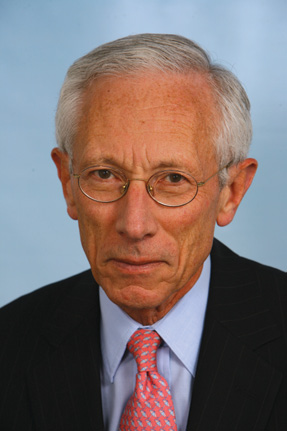
Stanley Fischer
There are well over half a million internet sites where you can search for information on Stanley Fischer, and they yield impressive results. Born in Northern Rhodesia (now Zambia) in 1943, he did his first two degrees at the London School of Economics. After completing his Ph.D at MIT in the States, he went on to become a professor in MIT's famed Department of Economics and also served as its chairman. He’s written books, was Ben Bernanke’s thesis advisor, has been Chief Economist of the World Bank and First Deputy Managing Director of the International Monetary Fund (IMF) – the number two position – as well as Vice Chairman of Citigroup, and a member of the Washington-based financial advisory body, the ‘Group of Thirty.’ And now, of course, he is crucial to our economy; Stanley Fischer is the Governor of the Bank of Israel.
What Wikipedia doesn’t tell you is this: Stanley Fischer is SO NICE. This man, who could make our stock market surge or crash with one casual comment, extends his hand and says “and where do you come from?” as we start our interview. Security guards at the bank melt at the mention of his name: “Stanley Fischer?” they say, – only they pronounce it ‘Stenlee’ - “Eizeh ish madhim!” (What a stunning man!) He says good-morning to them all, they inform me, every single day. With a smile. And in a region of the world where powerful people often have as many detractors as supporters, Fischer seems almost unique: Presidents and Prime-Ministers admire him, financiers give him credit for steering Israel through the latest world crisis relatively unscathed, politicians respect him and the public gets that warm and mellow feeling when he talks to us in Hebrew on TV.
During a life-time spent inventing economic theories, curbing inflation and steering countries to prosperity, where did Fischer find time to pick up Hebrew? Another fact that Wikipedia neglects to mention is that, as a young man, our Stan spent six months on Kibbutz Ma’agan Michael working in the laundry, picking bananas and farming fish. Between folding sheets and feeding carp, Fischer also put in long hours at the Ulpan, learning the Hebrew that would so endear him to millions of Israelis over forty years later, when he made his inaugural Governor’s speech in the slightly hesitant but grammatically perfect language of his new country.
But for Fischer, who has just been sworn in for a second term at the Bank of Israel, this position was not his first encounter with Israel’s economy. “My wife Rhoda and I have been coming to Israel since high school,” Fischer explains, “and in 1960 we were on the Habonim Machon Hachoref” (a program for southern hemisphere councilors in Youth Movements.) Fischer came back to Israel at the end of his first degree, and began looking for a job; an MSc. Scholarship from the LSE put paid to plans of aliyah just yet. Back in London Fischer got married, started his Ph.D at the MIT Department of Economics, and took his first academic job at the University of Chicago, “but we always had Israel in mind.” In 1972 he and his family spent six months here while he did a sabbatical at the Hebrew University in Jerusalem, and again they considered aliyah; two years after that they returned to Israel to check out possibilities of moving here. Then MIT approached Fischer with the proverbial offer that one can’t refuse, and relocation to the Holy Land was put on hold again. Two more sabbaticals here followed, as well as a month-long stint at the Bank of Israel in 1979.
Then, in 1983, Israel’s economy tanked. Inflation spiraled out of control. Everyone living here at the time can remember what happened: you’d try on shoes and agree on a price; by the time you reached the till to pay for them the cost had rocketed out of reach. At the time Ronald Reagan was the US President, George Shultz was his Secretary of State, and Fischer was one of Shultz’s advisors. America was keen to see Israel rebound from its economic morass and Fischer, together with Herbert Stein, was instrumental in persuading Peres (then Prime Minister), and Yitzchak Modai (Finance Minister), to take the necessary measures to counter hyperinflation and stabilize the economy. The plan worked; not only did Israel’s economy recover but it flourished.
That was not the end of Fischer’s involvement in Israel’s economy. Later, in his capacity as number two at the IMF, he dealt not only with the Israeli economy but also with those of our neighbors, Jordan and Egypt, keeping very much in touch with all economic developments in the Middle East. Still, despite all his close contacts with the country, the offer to head the Bank of Israel took Fischer by surprise.
“We were in the Caribbean,” he recalls, “and I was reading A Tale of Love and Darkness Amos Oz's autobiographical book about his youth and about growing up in Jerusalem when the State was young]. Suddenly my phone rang. It was Bibi Netanyahu, then the Minister of Finance, calling from Jerusalem, offering me the job.”
The rest is our history. Fischer is credited with keeping Israel on track during one of the worst economic downturns in recent history. He cut interest rates early into the crisis, intervened in the currency market to protect exports, and was the first central banker in the developed world to raise interest rates as the crisis seemed to abate. Fischer is in charge of striking the right balance between dealing with inflation while not letting unemployment spike, and ensuring that our economy keeps growing.
No small credit goes to Fischer for Israel’s positive financial figures. He instigated a historic wage agreement at the central bank in 2007, putting an end to a long-running labor dispute. His ousting of Bank Hapoalim’s Chairman, Dannie Dankner, protected that bank’s stability and customers. He conditioned his acceptance of the position of Governor on legislation to amend the Bank of Israel Law; the changes were approved in the Knesset last March. And he spearheaded Israel’s efforts to join the Organization for Economic Cooperation and Development – a group of 30 of the world’s richest nations; he hopes Israel will join the OECD later this year. (As this article goes to print it appears that Israel’s bid will be successful).
Fischer concedes that there are challenges ahead. Israel faces worrisome sustainability figures: the segments of society that traditionally do not work (Haredi men and Arab women) are growing, investments in infrastructure and human capital are necessary for continued growth, and it is obviously difficult to predict the future. However, he is optimistic. “From the middle of 2003 until 2008 our economy grew at an annual rate of 5%. For this year we are expecting growth of 3.7%, and for next year we are predicting 4% growth. This is good by international standards,” he says.
Although Stanley Fischer reads the ESRA Magazine regularly, he declined to give our readers a world scoop on whether our stock market is poised to go up or down, or hot tips on where to invest our money. But he did agree to share with us that he gets enormous satisfaction from his work here, and that he finds living in Israel most enjoyable. “Life here is very rich,” he says, “and for skilled and entrepreneurial people there are certainly many opportunities.” Here’s hoping that within Fischer’s second term the Bank of Israel Law will be amended yet again – extending the office of its Governor for a third term, and then a fourth.
 DEAR EDITOR 155
DEAR EDITOR 155 MODIIN ON THE MOVE
MODIIN ON THE MOVE HEALTH HINTS ONIONS FOR JAUNDICE
HEALTH HINTS ONIONS FOR JAUNDICE-1372524003.jpg) the key question
the key question  advantages of the living trust
advantages of the living trust Chaim BePlus
Chaim BePlus Pamela Peled
Pamela Peled